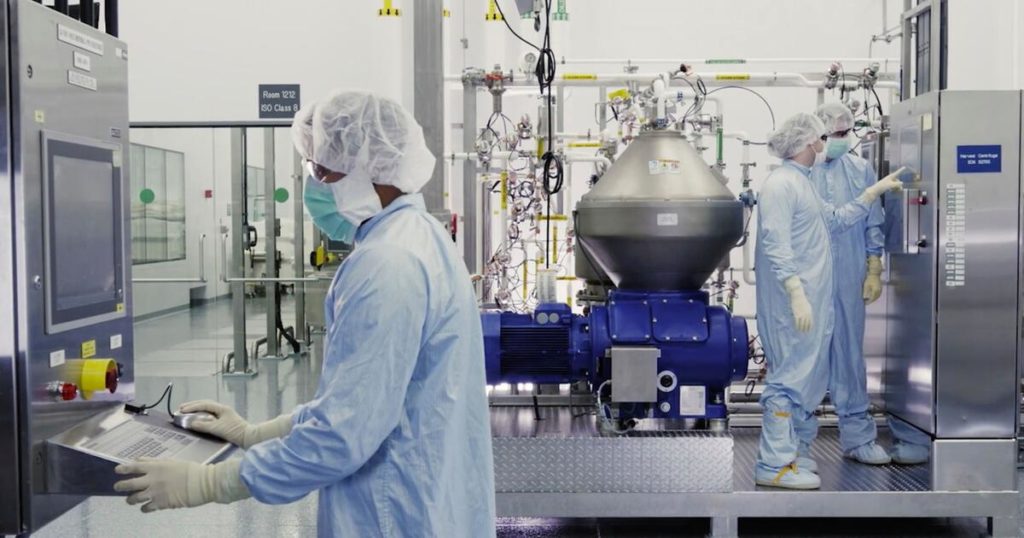This opinion piece is submitted by Michel Goldman on behalf of a collective of European scientists.
The EU Commission is committed to ensure rapid access of European citizens to the best available biopharmaceuticals against SARS-CoV-2.
So far, the only concrete action consisted in negotiating supply contracts with vaccine manufacturers on behalf of the 27 Member States. Prioritizing vaccines was the obvious thing to do but now is the time to also invest in anti-viral antibodies as part of an integrated Public Health strategy.
Neutralizing monoclonal antibodies targeting the SARS-CoV-2 spike protein are increasingly recognized as important tools to bridge the gap created by the vaccine shortage and slow pace of vaccination across the European Union.
Furthermore, even if the deployment of vaccines is improved, vaccines will not be effective in every person, depending on age and health status. Monoclonal antibodies and nanobodies produced by genetic engineering offer the most promising perspectives to address these issues.
Monoclonal antibodies and nanobodies represent the modern version of so-called passive immunization, a therapy pioneered in the late 19th century. At the time, several thousands of children suffering from diphtheria were saved by treatment with horse serum containing high titers of antibodies to the diphteria toxin.
This major advance originated simultaneously in France with Emile Roux and Germany with Emil von Behring who was awarded the Nobel Prize in Physiology or Medicine in 1901. Over the years, passive immunization against infectious agents was improved by using antibodies purified from plasma of immune individuals, and then by taking advantage of the monoclonal antibody technology, another breakthrough made in Europe by Nobel laureates, Cesar Milstein in UK and Georges Köhler in Germany.
In the field of infectious diseases, a monoclonal antibody to the respiratory syncytial virus is part of the standard of care of babies with a high-risk of developing bronchiolitis and a cocktail of monoclonal antibodies currently used for treatment of Ebola virus disease in conjunction with vaccination. A further complement are nanobodies which are antibody fragments comprising only one binding site. They are derived from heavy- chain antibodies in certain animal species. They can be produced at lower cost and more easily than monoclonal antibodies.
Since anti-viral antibodies and nanobodies appear as potential game changers for COVID-19, it is not surprising that they attracted the interest of many biotechs and big pharmas. No less than 14 anti-SRAS-CoV-2 antibodies or antibody cocktails are currently under clinical investigation.
As in the case of vaccines, the US Federal government took the lead in facilitating the development, regulatory approval and manufacturing of monoclonal antibodies. Early investment by the Defense Advanced Research Agency (DARPA) in antibody discovery platforms enabled identification of highly potent neutralizing antibodies which were rapidly evaluated in phase I safety trials, followed by accelerated development plans supported by the Biomedical Advanced Research and Development Authority (BARDA) and the US Department of Defense.
Regeneron, the front-runner in the antibody race, received a $450 million grant which facilitated the rapid ramp-up of clinical trials resulting in the Emergency Use Authorization of their anti-SARS-CoV-2 antibody cocktail (the one administered to the former US President) that was granted by the Food and Drug Administration (FDA) in November 2020.
AstraZeneca also received a $486 million grant from BARDA for the development of its anti-SARS-CoV-2 antibodies. In parallel, the National Institutes of Health (NIH) established the Accelerating COVID-19 Therapeutic Interventions and Vaccines (ACTIV) partnership which leveraged expertise from academic investigators and industrialists to advance the field. Collaboration between companies has been remarkable, the most recent example being the agreement being signed between Eli-Lilly, Vir Biotechnology and GSK.
The impressive US effort to accelerate the development and production of anti-SARS-CoV-2 antibodies is in stark contrast with the sparse support provided so far by the Coronavirus Global Response jointly developed by the European Commission and other governmental, corporate and philanthropic organizations under the COVID-19 Tools Accelerator (ACT-A).
It is only very recently that ACT-A prepared an investment case in which $365 million would be committed to reserve antibody manufacturing capacities and secure a volume guarantee for 9 million treatment courses at cost. This plan is highly welcome but will not provide an answer to the immediate need, namely providing a therapeutic solution to prevent severe disease in high-risk individuals soon after the infection or after close contact with infected individuals.
This situation led the German government to approve and purchase 200,000 doses of the anti- SARS-CoV-2 antibody cocktail of Regeneron for €400,000, independently from the European Commission. Likewise, France just granted a Temporary Use Authorization for the antibody developed by Eli-Lilly.
While the Regeneron antibody cocktail is currently under rolling review at the European Medicines Agency (EMA), now is the time to ensure access of these therapies to all European citizens, possibly by negotiating joint supply agreements and actively supporting Research & Development for therapeutic antibodies and nanobodies in Europe.
The recent emergence of several variants of the SARS-Cov-2 variants reducing the potency of most developed vaccines and the efficiency of several of the monoclonal antibodies already developed, provides the opportunity to Europe to play a leadership role on the second- generation antibodies able to provide broad coverage against emerging variants.
Still, several challenges remain to optimize passive immunization against COVID-19 and ensure global access across the world. Innovative solutions are needed to increase the stability of antibody products, develop more convenient routes of administration than intravenous injection, ensure that emerging variants are effectively neutralized, and most importantly develop innovative manufacturing technologies to produce these biologicals at scale under financially sustainable conditions.
European scientists and biotechs are at the forefront of research in this field but receive very limited support in the current programs of the European Commission. All hopes lie now in the Health Emergency Preparedness and Response Authority (HERA) that is supposed to emulate the US BARDA.
It is time to catch up and restore the European leadership in developing passive immunization strategies against Covid-19 and infectious threats to come!
Oriol Bestard, Alexandra Calmy, Godelieve Debree, Michel Goldman, Karine Lacombe, Andrzej Gorski, Stefan Kaufmann, Michel Kazatchkine, Antonio Parreira and Rino Rappuoli
Authors’ affiliations
Oriol Bestard
Head of Kidney Transplant Unit, Bellvitge University Hospital, Barcelona, Spain
Alexandra Calmy
Head of the HIV/AIDS Unit at Geneva University Hospital, Switzerland
Godelieve Debree
H-Team leader, Amsterdam University Medical Center, The Netherlands
Michel Goldman
Professor emeritus at Université libre de Bruxelles, Belgium Former Executive Director of the Innovative Medicines Initiative
Andrzej Gorski
Professor of Medicine,Institute of Immunology and Experimental Therapy, Polish Academy of Sciences, Poland
Stefan H.E. Kaufmann
Director Emeritus at the Max Planck Institute for Infection Biology, Berlin, and the Max Planck Institute for Biophysical Chemistry, Göttingen, Germany
Former President of the European Federation of Immunological Societies and of the International Union of Immunological Societies
Michel Kazatchkine
Senior fellow at the the Graduate Institute of International and Development Studies, Geneva, Switzerland Former Executive Director of Global Fund to Fight AIDS, Tuberculosis and Malaria.
Karine Lacombe
Head of the Department of Infectious and Tropical Diseases, Hôpital Saint-Antoine, Paris, France
Antonio Parreira
Clinical Director at the Champalimaud Centre for the Unknown, Lisbon, Portugal Professor emeritus of Hematology Oncology at the Lisbon New University
Rino Rappuoli
Chief Scientist at GlaxoSmithkline Vaccines
Director of the MAD lab, Toscana Life Sciences and University of Siena, Italy


